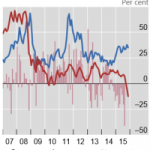Seoul, with its rapidly growing startup ecosystem is gaining precedence as one of the most promising entrepreneurial hubs in the world. Home to two of the most influential global tech leaders, Samsung and LG, the perception of Seoul has traditionally been of a corporate hub. But this is now rapidly changing, as a new breed of tech startups rise, and as the big boys begin to plateau.
South Korea is now rapidly moving towards an economic paradigm that supports innovation, rather than relying on manufacture. Supporting this rise are an increasing number of Seoul-based accelerators, many of whom aim to connect Korean entrepreneurs with overseas markets, like the USA, and China. What is particularly interesting is that until around four years ago there were no accelerators, whereas now there are more than ten. Here we look at some of the best ones.
The Ventures
The Ventures was founded early in 2014 by Changseong Ho and Jiwon Moon, who formerly created Viki, a community-driven distribution platform for TV contents. The company was acquired last year by Japanese Rakuten for $200 million.
The Ventures works very closely with startups for an unspecified period of time. Startups receive office space, mentoring, and professional support until they are ready to enter the market.
Full introduction article here.
FuturePlay
Founded in early 2014, FuturePlay focuses on funding early-stage tech startups. The company believes that in order to understand the market properly and have a solid basis, a startup company needs more than an acceleration period of 3-months. By combining incubator, accelerator, and venture capital, FuturePlay offers a paid, 12-month intensive program for talented entrepreneurs.
Digital Entertainment Ventures
Digital Entertainment Ventures launched in New York in 2012, and focuses mainly on media, entertainment, and platform businesses. They recently expanded to Korea. According to Kaine Kim the Co-CEO of DEV Korea, Seoul seemed to be the most suitable place for setting up a new office within the Asian market. This is in part due to the growing support of the Korean government, and the President’s “Creative Economy” initiative. Their program combines acceleration in both Korea, and the USA.














Leave A Comment